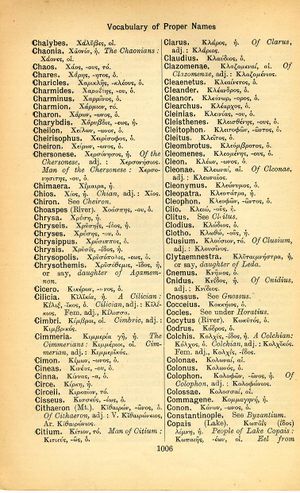Chrysa
κινδυνεύει μὲν γὰρ ἡμῶν οὐδέτερος οὐδὲν καλὸν κἀγαθὸν εἰδέναι, ἀλλ᾽ οὗτος μὲν οἴεταί τι εἰδέναι οὐκ εἰδώς, ἐγὼ δέ, ὥσπερ οὖν οὐκ οἶδα, οὐδὲ οἴομαι· ἔοικα γοῦν τούτου γε σμικρῷ τινι αὐτῷ τούτῳ σοφώτερος εἶναι, ὅτι ἃ μὴ οἶδα οὐδὲ οἴομαι εἰδέναι. → for neither of us appears to know anything great and good; but he fancies he knows something, although he knows nothing; whereas I, as I do not know anything, so I do not fancy I do. In this trifling particular, then, I appear to be wiser than he, because I do not fancy I know what I do not know.
English > Greek (Woodhouse)
Χρύση, ἡ.
Latin > English (Lewis & Short)
Chrȳsa: ae, or Chrȳsē, ēs, f., = Χρύση.
I A town on the coast of Troas sacred to Apollo, Plin. 5, 30, 32, § 122; Mel. 1, 18; Ov. M. 13, 174 (cf. Hom. Il. 1, 390; 1, 452).—
II An island near Crete, Plin. 4, 12, 20, § 61.—
III An island of India, Mel. 3, 7, 7.
Latin > French (Gaffiot 2016)
Chrȳsa, æ, f., Plin. 5, 122 et Chrȳsē, ēs, f., Ov. M. 13, 174,
1 ville de Mysie
2 île près de la Crète : Plin. 4, 61
3 île de l’embouchure de l’Indus : Mela 3, 70.

